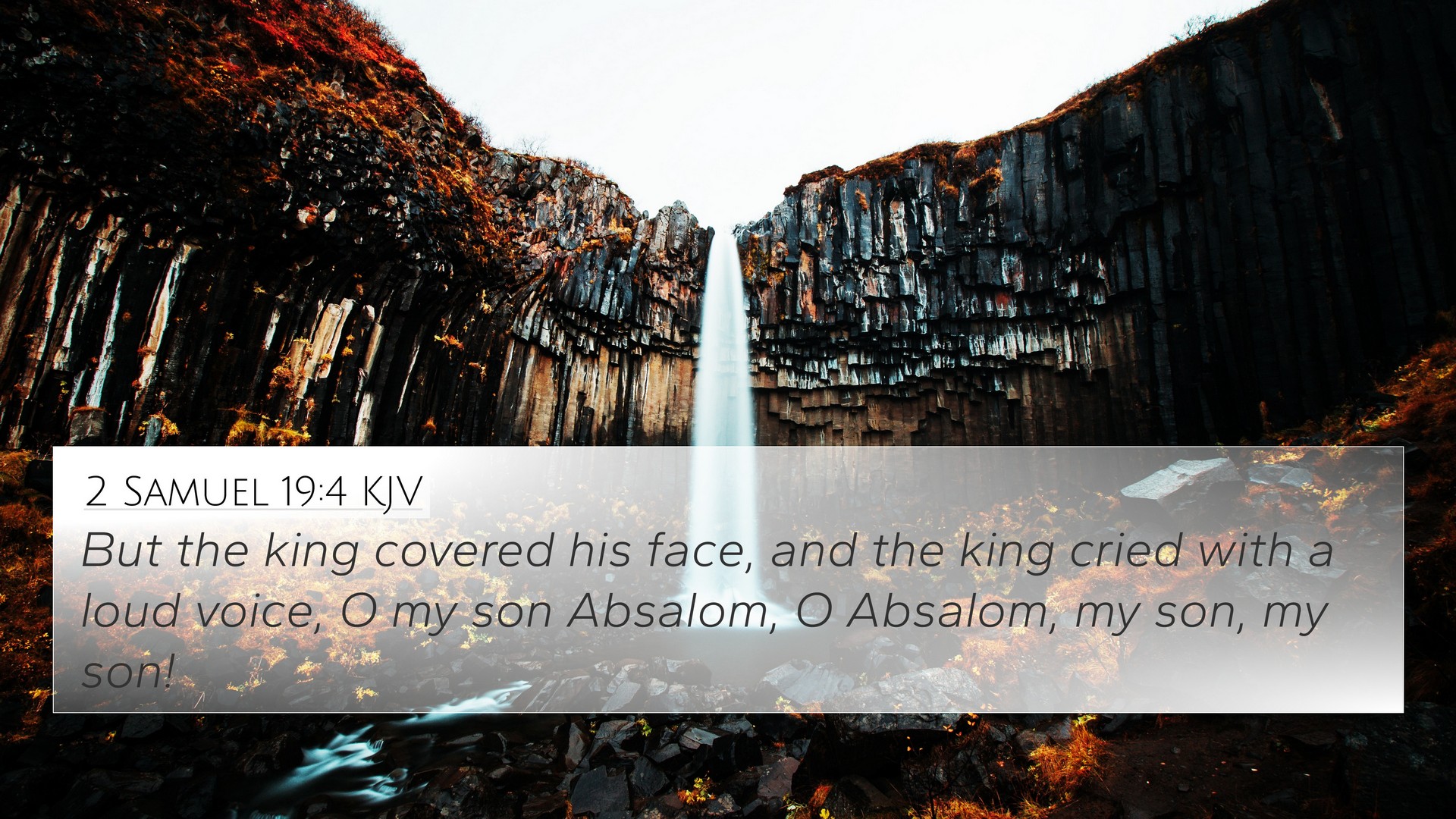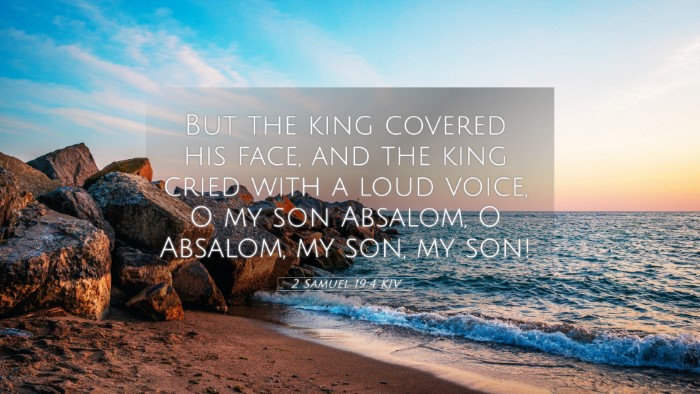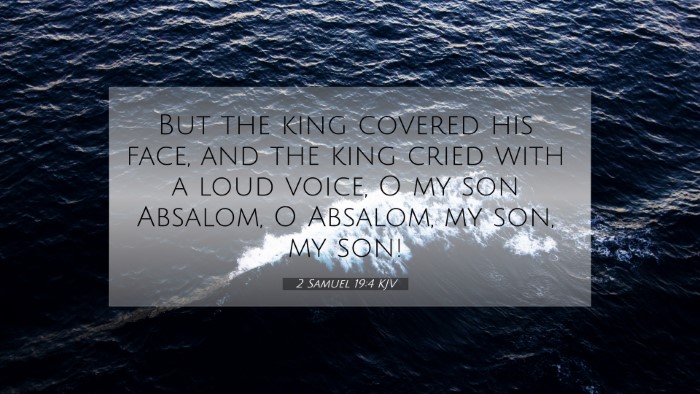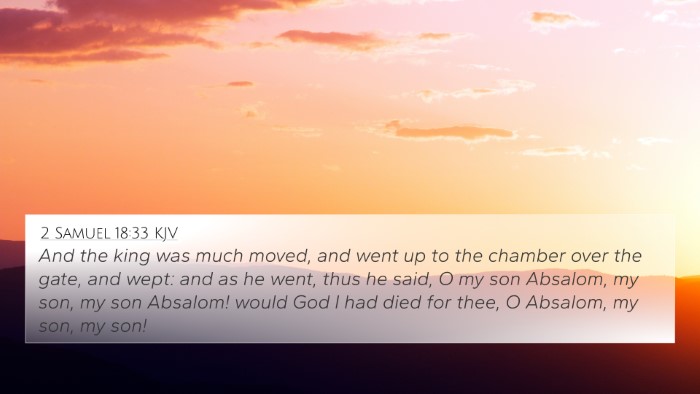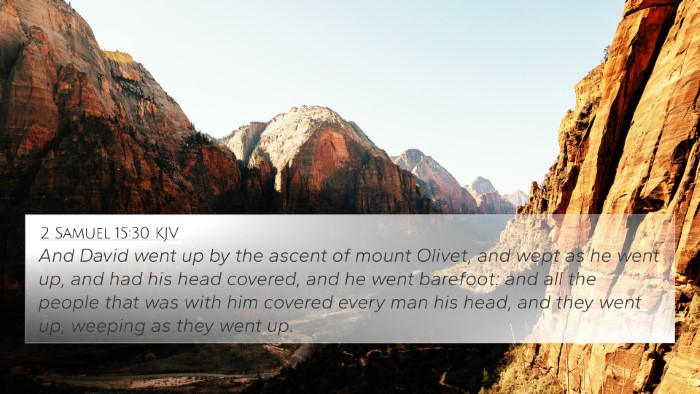Understanding 2 Samuel 19:4
Verse: "But the king covered his face, and the king cried with a loud voice, 'O my son Absalom, O Absalom, my son, my son!'" (2 Samuel 19:4)
Summary of the Verse Meaning
This poignant verse captures King David's profound grief over the death of his son Absalom. David's lament reveals the depth of his sorrow and the complexity of their relationship, highlighting themes of parental love, loss, and the consequences of rebellion.
Commentary Insights
-
Matthew Henry:
Henry emphasizes the intensity of David's grief, noting that such sorrow unfolds deeply within the heart of a father mourning his son. He suggests that David's cry reflects a deep-seated anguish that resonates with all parents who have experienced loss. The covering of his face symbolizes his despair and unwillingness to accept the death of Absalom, which showcases the nuances of familial relationships amidst conflict.
-
Albert Barnes:
Barnes highlights the tragic irony of David's situation, where his son Absalom, who sought to usurp his throne, still evokes such love and grief. The passionate repetition of "my son" signifies not only David's pain but also his acknowledgment of Absalom's potential and the lost future they could have had if matters had been different. This connection between father and son emphasizes a heartfelt sorrow that goes beyond mere political conflict.
-
Adam Clarke:
Clarke delves into the implications of David's reaction, indicating that the king's lament speaks to a universal experience of loss. He notes the depth of David's parental affection, contrasting it with Absalom's actions. Clarke points out that this cry reflects the agony of seeing a loved one, despite their faults, perish due to their own choices. Furthermore, David's grief illustrates the consequences of sin and strife within families.
Connections Between Bible Verses
To enhance our understanding of 2 Samuel 19:4, it is valuable to examine related scriptures that embody similarly potent themes of loss and reconciliation. Here are some pertinent cross-references:
- 2 Samuel 15:14: "And David said to all his servants who were with him at Jerusalem, 'Arise, and let us flee; for we shall not see Absalom.'"
- 2 Samuel 18:33: "And the king was deeply moved, and went up to the chamber over the gate, and wept. And as he went, he said, 'O my son Absalom, my son, my son Absalom!'"
- Genesis 37:34-35: "Then Jacob tore his garments and put sackcloth on his loins and mourned for his son many days. All his sons and all his daughters rose up to comfort him, but he refused to be comforted..."
- Luke 15:24: "For this my son was dead, and is alive again; he was lost, and is found.' And they began to be merry."
- Matthew 23:37: "O Jerusalem, Jerusalem, you who kill the prophets and stone those sent to you, how often I have longed to gather your children together, as a hen gathers her chicks under her wings, and you were not willing."
- John 11:35: "Jesus wept," illustrating the sorrow present even in the midst of hope.
- Romans 8:38-39: "For I am convinced that neither death nor life... will be able to separate us from the love of God that is in Christ Jesus our Lord."
Thematic Connections
This verse opens up a wider discourse on the nature of loss and reconciliation in the scriptural narrative:
- Parental Love and Loss: David's lament is a somber reminder of a father's love, seen also in Jacob's mourning for Joseph.
- Rebellion and Consequence: The relationship dynamics between parents and children are complex, often leading to tragic outcomes, as seen in the stories of both David and Abraham.
- The Nature of Grief: Scriptural examples, including Jesus weeping for Lazarus, illustrate the universal human experience of grief.
- Forgiveness and Redemption: Despite the strife, the underlying message often alludes to the possibility of reconciliation and forgiveness, central themes across biblical texts.
Conclusion
2 Samuel 19:4 serves as a profound expression of a father's love and grief in the face of loss, encapsulating themes universal to human experience. By examining the connections between this verse and others, believers can glean deeper insights into the nature of familial relationships, the consequences of rebellion, and the possibility of redemption. Utilizing tools for Bible cross-referencing can facilitate these discussions, offering a richer understanding of scriptural themes.
